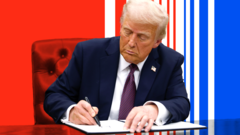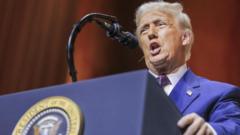President Trump's decision to impose tariffs on Mexico and Canada aims to address border security concerns, but it raises questions about economic repercussions for all involved.**
Trump’s Imposition of Tariffs on Mexico and Canada: Economic Fallout and Reactions**

Trump’s Imposition of Tariffs on Mexico and Canada: Economic Fallout and Reactions**
The Trump Administration's tariffs have sparked debates over their potential impact on the economy and international relations.**
The Trump Administration has ignited controversy as President Trump announced a sweeping 25 percent tariff on all Mexican exports to the United States, alongside a similar tariff on Canadian goods, though Canadian energy will be subjected to a lower 10 percent rate. The decision, which goes into effect immediately, is driven by Trump's advocacy for stronger border protections against undocumented migration and drug trafficking.
The move comes at a time when Mexico has established itself as the largest trading partner of the United States, exporting crucial products like vehicles and agricultural goods, while Canada remains a key crude oil supplier. The announcement has prompted urgent warnings from leaders in both countries that such tariffs could inflict significant damage on their economies, which are closely tied to that of the U.S.
President Claudia Sheinbaum of Mexico is among those expressing alarm about the tariffs. She argues that the new trade barriers will likely hurt not only Mexico's economy but also the many U.S. corporations that rely on Mexican manufacturing, including industry giants like General Motors and Ford. Moreover, U.S. consumers may end up facing increased prices for a variety of products, from fresh produce to automobiles, due to rising tariffs.
Amid escalating tensions, Sheinbaum has signaled Mexico's readiness to respond with retaliatory measures, potentially implementing its own tariffs in a tit-for-tat maneuver.
As the situation develops, analysts are closely monitoring the broader implications of such economic policies on trade relations between the three nations. The discourse surrounding these tariffs highlights the challenges of balancing economic considerations with national security aims, raising questions about the long-term impacts on regional stability and prosperity.
The move comes at a time when Mexico has established itself as the largest trading partner of the United States, exporting crucial products like vehicles and agricultural goods, while Canada remains a key crude oil supplier. The announcement has prompted urgent warnings from leaders in both countries that such tariffs could inflict significant damage on their economies, which are closely tied to that of the U.S.
President Claudia Sheinbaum of Mexico is among those expressing alarm about the tariffs. She argues that the new trade barriers will likely hurt not only Mexico's economy but also the many U.S. corporations that rely on Mexican manufacturing, including industry giants like General Motors and Ford. Moreover, U.S. consumers may end up facing increased prices for a variety of products, from fresh produce to automobiles, due to rising tariffs.
Amid escalating tensions, Sheinbaum has signaled Mexico's readiness to respond with retaliatory measures, potentially implementing its own tariffs in a tit-for-tat maneuver.
As the situation develops, analysts are closely monitoring the broader implications of such economic policies on trade relations between the three nations. The discourse surrounding these tariffs highlights the challenges of balancing economic considerations with national security aims, raising questions about the long-term impacts on regional stability and prosperity.





















